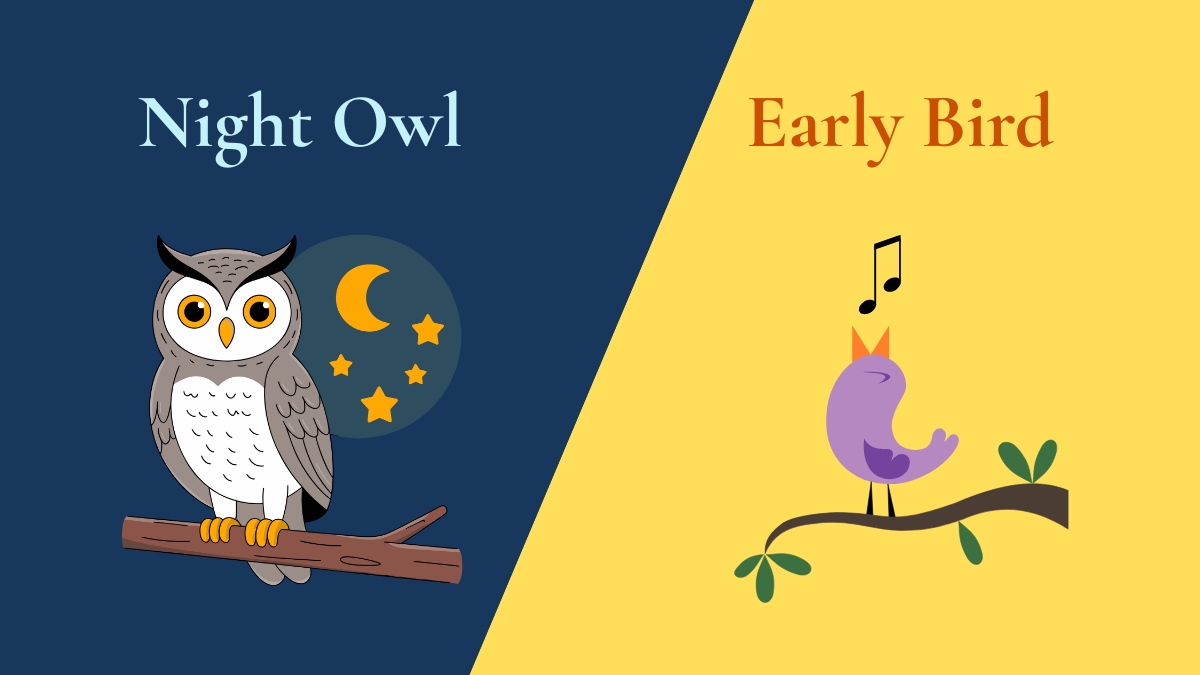Night Owls vs Early Birds: A night owl naturally stays up late whereas an early bird wakes up early. Night owls work better in late evenings, while early birds tend to perform best in the mornings. Every person falls into two main chronotypes which is either being a night owl or an early bird. This is based on when they feel most active and alert.
Imperial College London conducted a large scale study involving over 26,000 participants. The study showed that night owls often score higher on intelligence and reasoning tests than early birds. Night Owl vs Early Bird: Who is Smarter? has sparked debate over which chronotype is smarter and better suited to daily life. After you understand the major differences, it can help you to know your strengths better for greater productivity and well-being.
Read on to explore the key differences between night owls and early birds, including cognitive abilities and productivity patterns, to understand which chronotype is smarter and how each suits your daily routine best.

Who is a Night Owl?
Night owls naturally stay up late and experience peak alertness during late evenings or at night. Scientific studies indicate that night owls often excel in creativity, complex problem-solving, and cognitive flexibility. Their brain chemistry supports enhanced problem-solving abilities during their active hours.
Who is an Early Bird?
Early birds wake up early, usually feeling most productive in the morning hours. Early risers are frequently noted for their conscientiousness, discipline, and higher morning productivity. They adapt well to conventional work and school schedules. They are often more disciplined and proactive.
Are You a Night Owl or an Early Bird? Major Differences
Choosing between being a night owl or an early bird depends on one’s natural circadian rhythm, lifestyle, and occupational demands. Below is a table highlighting their major differences:
| Major Difference | 🌃 Night Owl (Evening Chronotype) | ☀️ Early Bird (Morning Chronotype) |
| Peak Alertness | Late evening or night | Early morning |
| Sleep-Wake Cycle | Late to sleep, late to wake | Early to sleep, early to wake |
| Cognitive Strengths | Higher creativity and IQ scores | Greater morning productivity |
| Brain Activity | Neural activity peaks in evening | Neural activity peaks in morning |
| Lifestyle Fit | Suited to flexible or late schedules | Suited to 9-to-5 or routine jobs |
| Mental Health | Potentially more mood variability | Generally better mood and sleep |
Night Owls vs Early Birds: Which Category Do You Belong to?
Night Owl Meaning: A night owl naturally stays up late. The circadian rhythms of Night Owls are delayed, which means their optimal cognitive performance occurs later in the day. They tend to have higher IQ scores in some intelligence assessments due to unique brain activity patterns supporting mental sharpness during their active hours.
Early Bird Meaning: An early bird wakes up early. Their circadian rhythm of Early Birds aligns closely with sunrise and traditional daily routines. Although early birds may score slightly lower than night owls on creativity or intelligence tests, research shows they tend to have better overall mental health, more consistent sleep quality, and higher optimism throughout the day.
Night Owls vs Early Birds: Who is Smarter?
Research suggests night owls tend to outperform early birds on several cognitive tests measuring intelligence, reasoning, and problem-solving. The Imperial College London study revealed night owls scored 7.5 to 13.5 percent higher than early birds in mental sharpness.
Night owls’ heightened brain activity during their peak hours is linked to creativity and advanced problem-solving skills. However, early birds excel in structured environments and often perform better academically due to discipline and routine. Intelligence is multifaceted, meaning one chronotype isn’t universally “smarter” but displays distinct cognitive strengths.
Is It Better to Be a Night Owl or Early Bird?
Neither chronotype is universally better; it depends on individual preferences, health, and lifestyle.
-
Early birds benefit from aligning with societal norms, experiencing better mental health and consistent routines.
-
Night owls thrive in creative and cognitively demanding tasks during evenings but can struggle with sleep deprivation if forced into early schedules.
Both chronotypes require sufficient, good-quality sleep and routines tailored to their natural rhythms to maximize productivity and well-being.
Read Other Current GK Stories here:
Difference Between Rich vs. Wealthy, Tidy vs. Neat, Quiet vs. Quite
Lime vs Lemon: Check All the Differences Here!
Conclusion
Night owls often show greater intelligence and creativity, while early birds benefit from better alignment with societal schedules and mental health. Knowing your chronotype helps optimize productivity and health by customizing your daily routine rather than striving to be a certain type.
Comments
All Comments (0)
Join the conversation